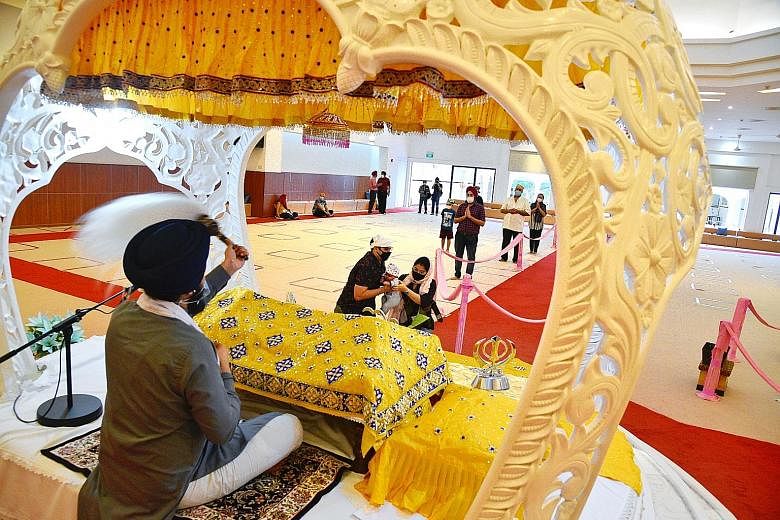Live music during worship services will resume at 16 religious organisations from Saturday in a pilot project.
Another pilot scheme will involve having up to 250 people in worship services, said Minister for Culture, Community and Youth Edwin Tong yesterday, in providing details of the latest round of Covid-19 restrictions easing.
Noting that live music is an integral part of how people practise their faith, he said that the pilot can "scale up" if Covid-19 infections here stabilise. "We'll see how that goes and then decide what are the learning points," said Mr Tong, who is also Second Minister for Law, after a visit to the Central Sikh Temple.
He was providing details of how more religious activities could safely resume following last Wednesday's announcement of the further easing of Covid-19 safety measures, allowing up to 100 people to congregate from this Saturday - double the current limit.
Among the 16 organisations in the pilot are the Central Sikh Temple, Covenant Evangelical Free Church in Woodlands, the Singapore Buddhist Lodge, Lorong Koo Chye Sheng Hong Temple Association, Sri Layan Sithi Vinayagar Temple and St Joseph's Church in Bukit Timah.
The Ministry for Culture, Community and Youth (MCCY) said they were selected after consultations with members of the National Steering Committee on Racial and Religious Harmony.
Under the first pilot, up to 10 musicians or singers will be allowed on stage, with a maximum of five people unmasked at any one time.
If singing is conducted in an indoor space, then only two can be unmasked.
While all masked individuals have to keep a metre apart, those unmasked have to maintain 2m from one another.
There should also be at least 3m between the singers and the congregation. If the height of a stage places them at a higher vantage point, then an even farther safe distance is encouraged.
The congregation has to remain masked during worship services and cannot sing, although they can give spoken responses.
Congregational services must be split into two zones of up to 50 people each with no mingling between groups, even though up to 100 people may attend services from Saturday.
For places with more structured services, such as churches, mosques and gurdwaras, the two zones must be separated by a physical partition or barrier, with separate entrances and exits or staggered entry and exit timings for each zone, said MCCY.
Places with more transient worship settings - such as Buddhist, Taoist and Hindu temples - should ensure no crowding at common areas and in the prayer halls, and safe distancing between worshippers.
The existing caps on funeral-related activities will remain at 30 people and on religious classes at 50 people.
Religious organisations that have safely conducted services for 100 people may apply to the MCCY to participate in the pilot to increase crowd limits to 250.
Applicants will be assessed based on the layout of their premises and crowd management measures, among other considerations.
Mr Baljit Singh, president of the Central Sikh Temple board, said: "We are extremely grateful that... a higher level of normalcy returns."


